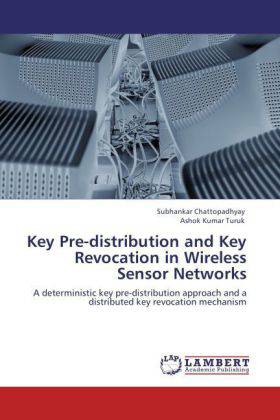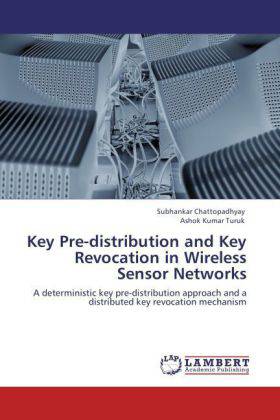
Bedankt voor het vertrouwen het afgelopen jaar! Om jou te bedanken bieden we GRATIS verzending (in België) aan op alles gedurende de hele maand januari.
- Afhalen na 1 uur in een winkel met voorraad
- In januari gratis thuislevering in België
- Ruim aanbod met 7 miljoen producten
Bedankt voor het vertrouwen het afgelopen jaar! Om jou te bedanken bieden we GRATIS verzending (in België) aan op alles gedurende de hele maand januari.
- Afhalen na 1 uur in een winkel met voorraad
- In januari gratis thuislevering in België
- Ruim aanbod met 7 miljoen producten
Zoeken
Key Pre-distribution and Key Revocation in Wireless Sensor Networks
A deterministic key pre-distribution approach and a distributed key revocation mechanism
Subhankar Chattopadhyay, Ashok K. Turuk
Paperback | Engels
€ 48,45
+ 96 punten
Omschrijving
Sensor networks are composed of resource constrained tiny sensor devices. They have less computational power and memory. Communication in sensor network is done in multi-hop, and for secure communication, neighboring sensor nodes must possess a secret common key among them. Symmetric and public key cryptography require more processing and memory space. Hence, they are not suitable for sensor network. In this book we proposed a deterministic key pre-distribution scheme using BCH codes. We mapped the BCH code to key identifier and the keys corresponding to each key identifier are installed into the sensor nodes before deployment. We compared our proposed scheme with existing one and found that it has a better resiliency. Our proposed scheme is scalable and requires the same or less number of keys for a given number of nodes than the existing well known schemes. We have also proposed an efficient key revocation technique using a novel distributed voting mechanism in which neighboring nodes of a sensor can vote against it if they suspect the node to be a compromised one. In the proposed key revocation scheme compromised nodes as well as the compromised keys are completely removed.
Specificaties
Betrokkenen
- Auteur(s):
- Uitgeverij:
Inhoud
- Aantal bladzijden:
- 72
- Taal:
- Engels
Eigenschappen
- Productcode (EAN):
- 9783846557754
- Uitvoering:
- Paperback

Alleen bij Standaard Boekhandel
+ 96 punten op je klantenkaart van Standaard Boekhandel
Beoordelingen
We publiceren alleen reviews die voldoen aan de voorwaarden voor reviews. Bekijk onze voorwaarden voor reviews.









